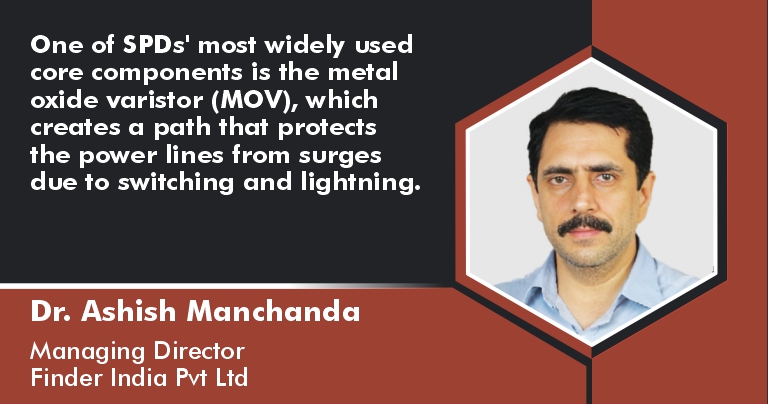Advancements in surge protection devices catalyse power infrastructure resilience
By EPR Magazine Editorial December 26, 2023 3:18 pm IST
By EPR Magazine Editorial December 26, 2023 3:18 pm IST

One of SPDs’ most widely used core components is the metal oxide varistor (MOV), which creates a path that protects the power lines from surges due to switching and lightning.
Surge Protection Devices (SPDs) shield electrical infrastructure from voltage surges. Innovations like high-power MOV technologies and smart SPDs enhance reliability, ensuring resilience in critical power systems. Ashish from Finder shares his views on SPD innovations in talks with EPR Magazine.
Revolutionising surge protection devices
Surge protection devices (SPDs) are critical components of electrical infrastructure that protect against surge over-voltages. One of SPDs’ most widely used core components is the metal oxide varistor (MOV), which creates a path that covers the power lines from surges due to switching and lightning. Moreover, new technologies such as suppressor diodes, spark gaps, gas discharge tubes, etc., are now used to protect the power, data and signal lines against transients that are much more likely to occur within the critical electrical infrastructure in plants and building applications. Although the basics remain the same, innovations in higher surge current handling capacity devices, visual and remote indication functionality and safe thermal disconnection mechanisms have become a de facto standard for the SPDs used in electrical infrastructure.
The growing demand for smart power line SPDs with Surge Counter and pluggability options has now created space for the Type 1+2 SPDs used in the low voltage mains incomer cabinets. Strips are also one of the major factors accentuating the market growth. Typically, for the LV electrical infrastructure, surge protection devices are now being installed and used by the BIS/IEC standards, making it necessary to be installed to protect information technology infrastructure in homes and offices and control technology infrastructure in plants and machinery. The use of new high-power MOV-based technologies of SPDs in electric vehicle charging, solar photovoltaic systems, and PLC systems is now being registered as a necessity for the safety of electrical systems and for enhancing the reliability and availability of the equipment.
Seamlessly integrating into smart grids
Considering the given fac contributes be less integrated into smart grids and electrical infrastructure to provide real-time surge protection and contribute to the overall resilience and reliability of the power distribution system.
Placement: SPDs should be placed strategically in the electrical infrastructure to provide comprehensive protection from potentially damaging and disruptive surge events. Cascading parallel-connected devices at service entrances and power distribution panels, coupled with series-connected devices at both load equipment and internal sources of transients and noise, always provide a comprehensive protection solution.
Automation: Smart grids can monitor power flows from points of generation to points of consumption (even down to the appliance level) and control the power flow or curtail the load to match generation in real-time or near real-time. Smart SPD solutions can contribute to the reduction of T&D losses, peak load management, improved quality of service, increased reliability, better asset management, renewable integration, better accessibility to electricity, and also increased service life of the sensitive automation electronics hardware.
Communication: SPDs can be integrated into smart grids using communication technologies like the Internet of Things (IoT). This can enable real-time monitoring and control of the SPDs’ life and give the user a timely intervention to arrange replacements and spares for ease of maintenance.Regulation: The installation of hardwired SPDs at key points throughout the distribution system is the most efficient way to protect electrical systems from surges. Therefore, it is important to have regulations and technical specifications that mandate installing SPDs in electrical infrastructure.
Maintenance and performance monitoring of SPDs
SPDs are, by default, built with self-sacrificing technology, so a proper design for effective maintenance and performance monitoring is an essential part of their design philosophy. One of the most important selection criteria is to opt for the required level of surge impulse current (Iimp), maximum surge current (imax), and nominal surge current (Nim) in the capacity of these SPDs.
Monitoring the life and performance of Surge Protective Devices (SPDs) is crucial for maintaining the safety of critical electrical infrastructure. Key methods include a remote indication for end of life, allowing timely replacement without physical presence. Surge impulse counter that offers a direct surge count proportional to lifespan. Smart monitoring devices that provide surge intensity and issue alarms for the health status of ground connectivity and series disconnector devices such as fuses and MCBs. These approaches collectively enable efficient and proactive management of SPDs, ensuring the continuous protection of electrical systems.
Safeguarding power infrastructure from EMP-related disruptions
An electromagnetic pulse (EMP) is a short burst of electromagnetic energy that can damage electronic equipment. EMPs can be natural or man-made and are broadly divided into three categories: natural, man-made, and military.
Natural EMP includes lightning electromagnetic pulse (LEMP) and electrostatic discharge (ESD). Man-made EMP includes the switching action of electrical circuitry, continual switching of digital circuitry, and power line surges. Military EMP is generated using nuclear and non-nuclear technology. SPDs are required to protect against EMPs, but a comprehensive protection philosophy must also be adopted, including a sound earthing or grounding system, external lightning protection systems, equipotential bonding, etc.
Spokesperson: Dr. Ashish Manchanda, Managing Director – Finder India Pvt Ltd
We use cookies to personalize your experience. By continuing to visit this website you agree to our Terms & Conditions, Privacy Policy and Cookie Policy.